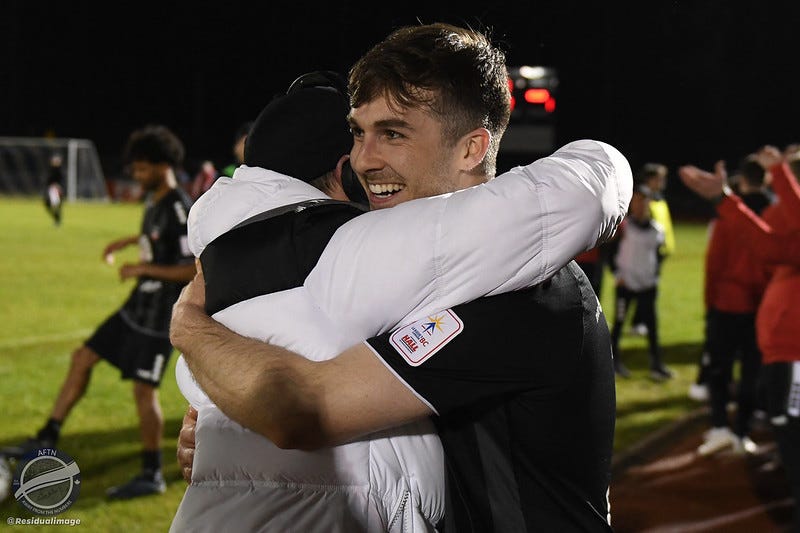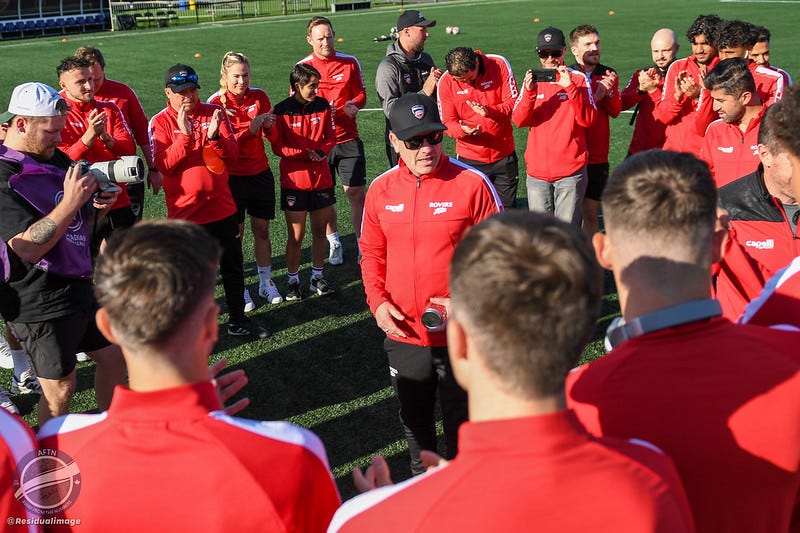What Players Really Need—and What We Keep Forgetting
The best coaches don't just build players—they protect their spirit. From aches to insight: three powerful truths every coach and mentor should carry onto the pitch.
As promised, an opinion piece here and there. You were warned. :)
Belief
A lightning and thunder show was the reward for an absolute drenching on the pitch. The rain had pelted down, and in truth, I knew it was coming. I was aware of the imminent atmospheric flood because my ankles and left shoulder had indicated hours before that the weather was changing—a dull ache beginning, one that always tells me when the skies will open. One that also leads me, as so many times before, toward the tablet bottle.
I take these aches and pains internally as an indicator of the gap that appears to be closing between my youth and the looming cheaper bus fare awarded to the "mature" passengers—a milestone sadly not far away.
However, as it pertains to football, these physical difficulties also remind me that I have spent a long time around this game:
Seen and done things on multiple continents
Spent thousands of hours playing and coaching
Collected experiences that are valuable if thoughtfully curated and shared
A damaged body, an old head, and an undying love for this game—like my bolted ankle—are things I simply cannot shake.
So, to you my friend—be you a parent, a teacher, a coach, a player, club staff, or anyone mentoring young people—my aim is to serve your players by serving you.
Shall we?
What Does Every Player Want—and Why?
There is no end to the laundry list of football (soccer) requirements. Tactics, video analysis, structured play, periodized training weeks, glossy social media images, speed trackers, distance trackers, roaring supporters, logoed uniforms, protein powders, apps for scheduling, luxury buses, kit bags—the list goes on and on.
The game today is so full of "professional indicators" that we've slowly but steadily moved away from the essence of developing players.
We think posting a video montage of last week’s match is critical for player growth. We drown in omnipresent data, desperately trying to confirm what we already believe.
Meanwhile, parents attempt to buy their way to the top through 1-on-1 trainers, gym sessions, supplements—anything they think might get their child to the show.
Yet from ages 6 to 36, rarely do we simply sit still and ask a player what they want.
The answers aren’t surprising.
What’s surprising is how lost we’ve become in delivering what every player truly needs.
A Relentless Reminder
Today, the ache in my left shoulder is dull but constant—a relentless reminder to reflect on what the years have taught me.
After tens of thousands of hours on a pitch or preparing for sessions, I can think of no greater lesson than this:
A great coach is less about improving a player and more about not ruining what a player or person can become.
Do less harm.
There it is.
A golden rule learned through many roles, teams, sessions, games, leagues, clubs, businesses, and relationships.
The world is overflowing with misinformation, snake oil salesmen, and doom-scrolling must-haves. Coaches parade cloud-sourced training sessions in front of parent accountants and electricians masquerading as football experts.
Meanwhile, the heart of what a player wants—and deserves—remains simple.
Here it is, broken down:
Believe in them
Support them to improve at their craft
Have a real connection with them
If you do nothing else but internalize these three things, you are already far ahead.
If you want more depth on how to implement them, read on.
1. Believe in Them
Confidence is a tricky thing.
It's been studied endlessly—and yet it rarely appears meaningfully in coach education.
We spend our formal education time on techniques and tactics, yet spend most of our real time dealing with:
Playing time disputes
Players' self-belief issues
Poor performances
Relationship challenges
Players know when you care.
They also know when you don't.
And when you don't show any care or belief, the damage travels faster and cuts deeper than any tactical brilliance you might bring.
You're busy—I get it. Video clips to compile, tactical plans to perfect.
But know this:
You can't execute tactics with players who feel you don't believe in them.
It’s like your health:
You can spend an hour at the gym today—or five days sick next week.
You can spend a few minutes each week showing your players you believe in them—or deal with chaos later when the team fractures.
How to Start?
Players know you care when they feel you don’t have only your own interests at heart.
They must feel that their life, growth, and joy are more important than your ego, your results, or your next promotion.
To start:
Know thyself
Peer deeply into your own heart. See yourself honestly. Be authentic. (We’ll dive deeper into this another time.)Start a real conversation
Not about performance.
Not about results.
Just about who they are as a person.
From there, you’ll understand their motivations, their fears, their dreams—and you will begin to believe in them in a way that matters.
A little belief in a lot of players often shows up on the scoreboard.
2. Make Them Better
This is your job.
Every. Single. Player.
Where are they on their journey?
How do you know?
Is it a bias toward speed? Toward strength? Toward goal scorers?
Why are you only noticing the flashy ones?
The truth:
Most coaches spend so much time chasing results and perfect plans that they neglect the very people who could deliver everything they dreamed of.
Today, players are often treated like video game characters:
Do this.
Move there.
Run this way.
Worse still:
Here’s your stat line.
Watch this clip of how terrible you were.
Look at this billion-dollar team, they do it well—why can't you?
This isn’t about you.
Do less harm.
Transparent Assessment
You must transparently assess:
Each player individually
The group as a whole
Yourself as a coach or leader
Not just technical and tactical competence.
You must also assess:
Emotional maturity
Feelings of safety and confidence
Mental health
Resilience
Joy
Spend real time considering:
Who are they?
What do they need from me?
Involve them.
Ask them to analyze themselves honestly, with no fear of judgment.
Make it clear: whether they are starting or sitting, you are there to support them.
3. Make a Connection with Them
Looking back on the first two points, you’ll notice it all starts—and probably ends—with a relationship.
I've added this third point simply to emphasize the importance of communication and personal relationships with each player.
It is the backbone for everything you’ll ever do on the pitch.
Connect with them as people.
Some players will be brief and guarded—you’ll need to gently crack them open.
Others will seek you out like a psychologist—you’ll need to establish healthy barriers.
These are all things you will learn.
These are all areas your staff will learn to support and your team will grow together.
The important thing is to trigger that connection and try to build an honest relationship.
The rest of the work flows from there.
Start Tonight
Send a text.
Make a phone call.
Ask:
"How are you doing?"
And most importantly:
"I care."
You Will Fail
Like parenting or being in any real relationship, it will never be smooth or perfect.
But by establishing that you care, you give yourself an opportunity to survive any dips or wobbles in your work.
Mistakes are accepted when people and players believe you have their best interests at heart.
Don’t worry about doing this perfectly.
Simply start.
Football and life are mirrors of one another.
Get busy doing, rather than planning.
Final Whistle
My ankles still ache and the rain has subsided.
Life continues—and today is another day to help your players be better.
Go now and support them to be everything they can be.
Believe in them all.
Make them better.
Connect with them.
And do no harm.
📣 Final Invitation
If this resonated with you, I'd love if you shared it with a coach, parent, or player who might find it helpful.
You can also hit the ❤️ "Like" button or leave a comment — I'd love to hear your thoughts and experiences on building real connections with players.







